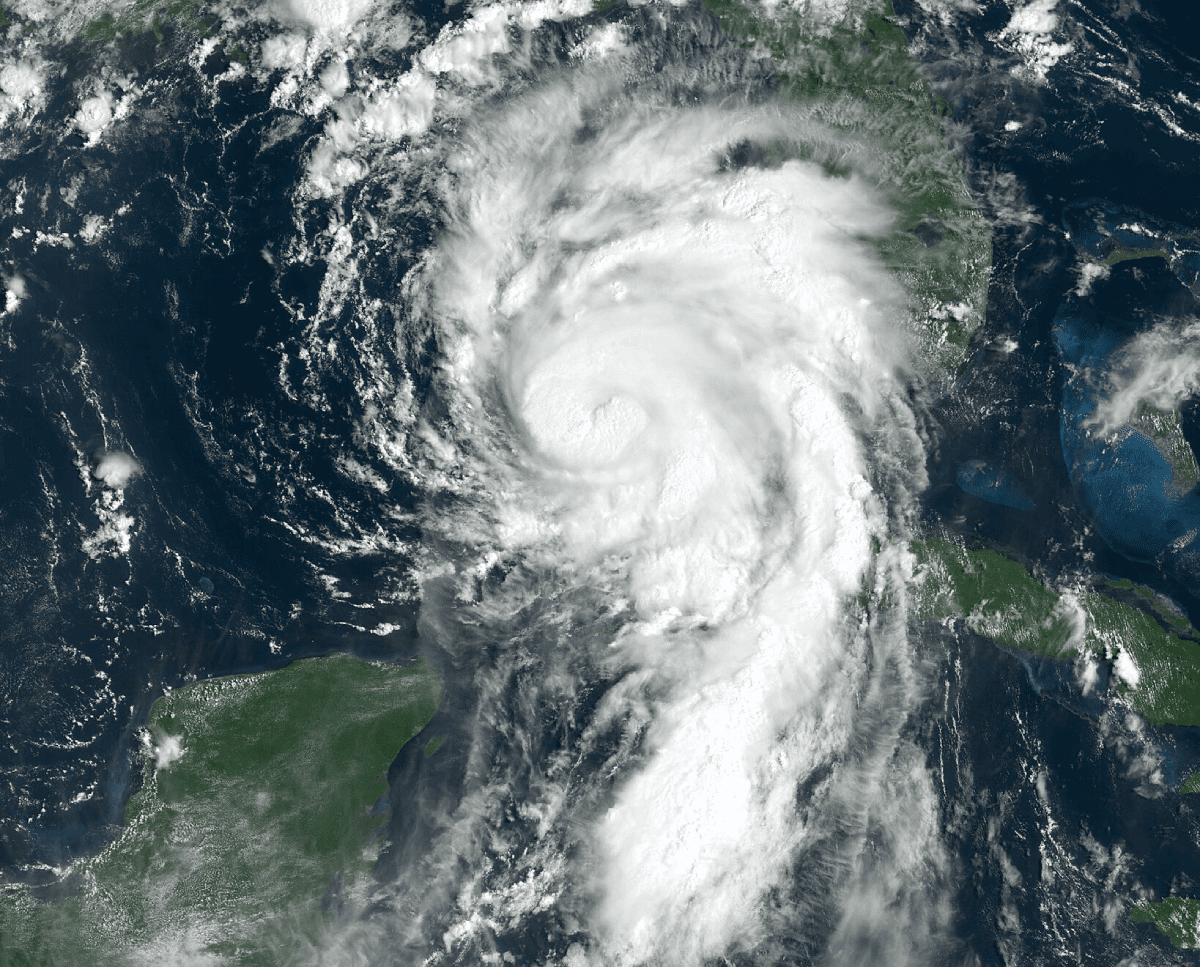Photo above: Hurricane Idalia gradually intensifying on the morning of August 29, 2023. ABI imagery from NOAA’s GOES-16 Satellite (Source: Wikipedia).
After a hurricane makes landfall, you probably have a lot of questions about insurance and repairs. Understanding the legality of who is responsible for what damage can get confusing. So, let’s examine some frequently asked legal questions that arise from hurricanes and storms.
1. I live in a condominium or other property with a homeowners’ association. Can I withhold payment of my HOA dues until the association repairs the damage done to common areas?
No. While the homeowner’s association is undoubtedly obligated to arrange for the repairs of these common areas, you and every other homeowner jointly belong to the association, and repair issues should be pursued with the association itself. Additionally, the budgeting for these repairs may require the homeowners’ collective input. Any unexplained failure to engage or address repairs must be pursued through the homeowners’ association itself.
2. Is my mortgage company required to excuse my monthly payments if I cannot make payments due to a storm or hurricane?
No general law requires that mortgage payments be excused due to hardship from storms or hurricanes. Your mortgage company could identify failure to pay as a default on your mortgage and may pursue foreclosure. However, in the event of a hurricane or storm, you should contact your mortgage company or loan servicer to confirm if they offer mortgage relief, what programs are being offered, whether or not you qualify, and how to apply.
3. Am I responsible for damages caused by a tree that was felled during a storm or hurricane?
Damages caused by a tree falling due to a storm or hurricane are typically considered an “act of God” and are likely the responsibility of the owner of the damaged property if there was no prior indication or knowledge that the tree was likely to fall. Furthermore, removing the fallen tree will, in most instances, be the responsibility of the property owner upon whose property the tree landed, regardless of whose property the tree originally belonged. Your liability insurance may cover the damage, but there will usually be a high deductible on damages resulting from high winds and acts of nature. Contact your insurance provider for exact details.

A Coast Guard MH-65 Dolphin aircrew from Air Station Miami assesses the damage of Mexico Beach, Florida, from Hurricane Michael, Oct. 11, 2018. After a storm passes, the Coast Guard focuses on saving lives in the impacted area and responds to hazardous environmental threats. (U.S. Coast Guard photo by Petty Officer 1st Class Colin Hunt)
4. Do I need to file a lawsuit if my insurance company refuses to approve my claim for property damage?
No. You can request mediation with your insurer. Your LegalShield provider lawyer is available to discuss the process and provide the information you may need to present to the mediator.
5. What can I do if my landlord refuses to repair the damage to my rental?
In most states, landlords typically have seven days to fix damages done to rental properties unless the lease specifies that the repairs are the tenant’s obligation. If your landlord makes a reasonable effort to remedy the violation within seven days, or if the noncompliance is beyond their control, you cannot terminate the lease unless the unit is uninhabitable. However, you may be allowed to withhold a portion of rent if the premises remain damaged or uninhabitable. Remember, a tenant typically doesn’t have these rights until the required notice to fix or repair is mailed or hand-delivered to the landlord.
6. Can I be reimbursed if I am renting an apartment or house and my personal property is damaged due to a hurricane or storm?
Hopefully, you have renter’s insurance. If so, you should contact your insurance company and report your loss. If not, you should see if your lease will cover your losses.
7. Can I be held responsible for storm damage caused to rental property?
Unless specified in your lease, your landlord will probably be responsible for damages caused by a storm unless it can be proved that your own negligence caused the damage.
8. I was issued a check from my insurance provider, payable to me and my mortgage company. Does this mean my mortgage company must also endorse the check?
Yes. As a general rule, insurance companies issue this type of check because mortgage companies require it as a condition of your loan. After all, it has a lien on your property in the amount of the outstanding mortgage and, therefore, has a vested interest in seeing that all the necessary repairs are completed. Most mortgage companies have the right to require a homeowner to endorse the insurance check and deliver the funds to the mortgage company to be disbursed by the company periodically as the repairs are made. The mortgage company also may have the right to inspect the repairs before it releases the money. You should contact your mortgage company to discuss the specific guidelines.
LegalShield is here to help
Whether you’re dealing with hurricane or storm damage, your LegalShield provider lawyer can help consult you on personal legal issues. From reviewing insurance policies to answering contract questions, we are here for you.
Additional resources:
- 7 Ways to Prepare Your Family for a Natural Disaster
- Emergency Prepping: What to do in a Natural Disaster
Pre-Paid Legal Services, Inc. (“PPLSI”) provides access to legal services offered by a network of provider law firms to PPLSI members through membership-based participation. Neither PPLSI nor its officers, employees or sales associates directly or indirectly provide legal services, representation, or advice. The information available in this blog is meant to provide general information and is not intended to provide legal advice, render an opinion, or provide any specific recommendations. The blog post is not a substitute for competent legal counsel from a licensed professional lawyer in the state or province where your legal issues exist, and the reader is strongly encouraged to seek legal counsel for your specific legal matter. Information contained in the blog may be provided by authors who could be third-party paid contributors. All information by authors are accepted in good faith, however, PPLSI makes no representation or warranty of any kind, express or implied, regarding the accuracy, adequacy, validity, reliability, availability, or completeness of such information.





